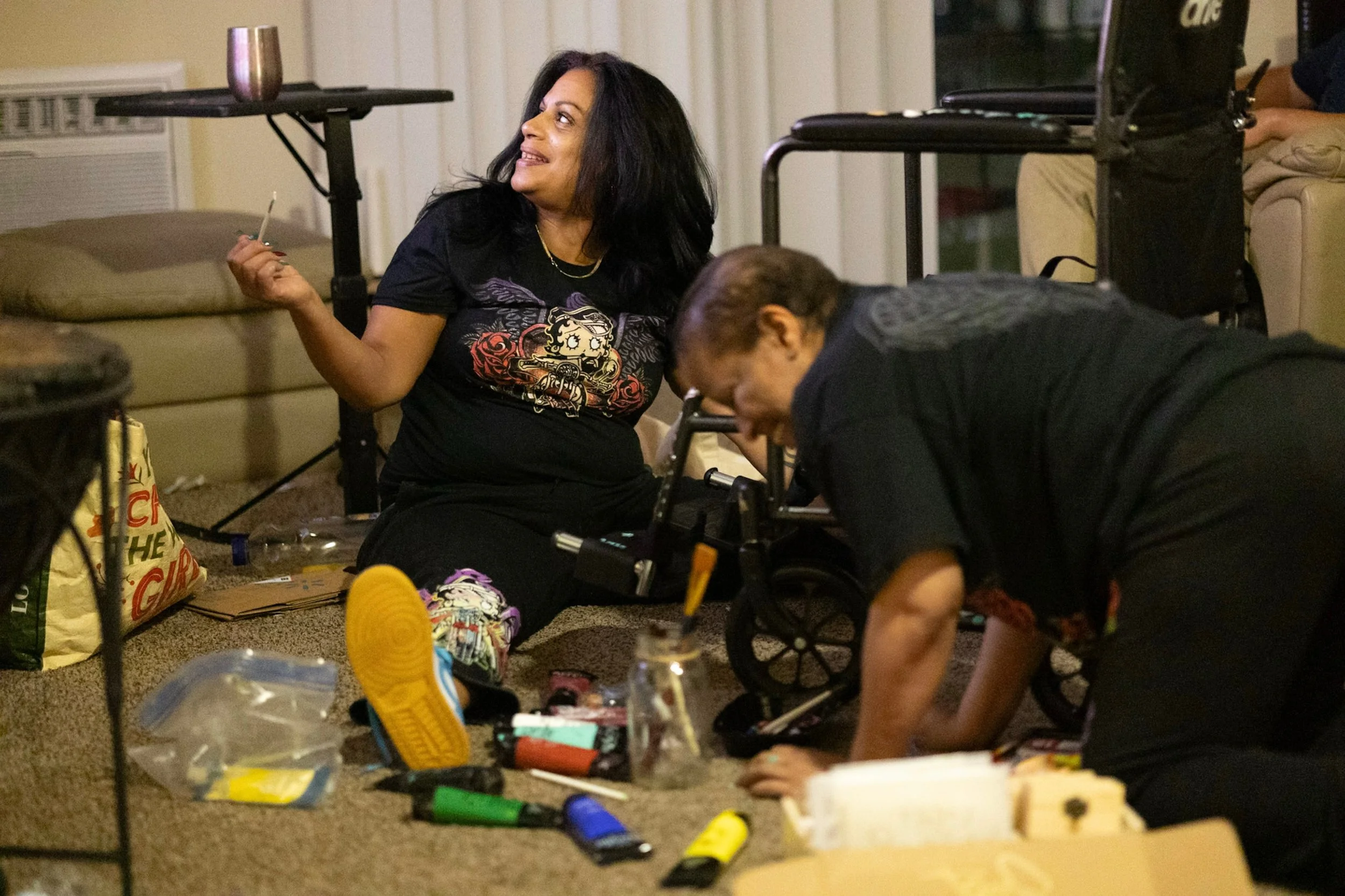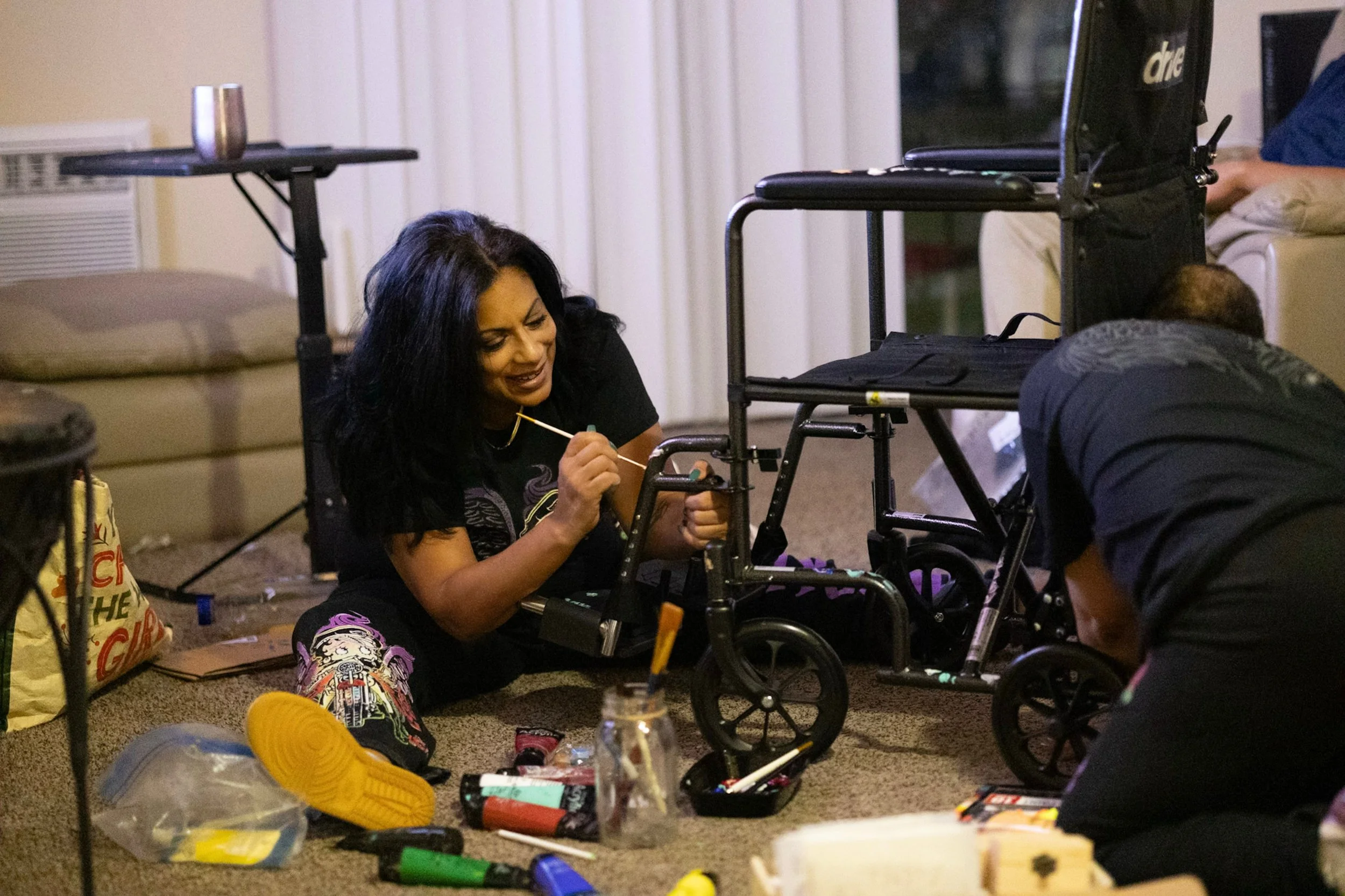What’s In Your Purse?
One of the most painful patterns we see is how rarely mothers of children with disabilities feel safe naming their own mental health needs. Many are living with anxiety, depression, burnout, trauma responses, and complicated grief, but keep it all to themselves. It is not because they have nothing to say. They are afraid of what will happen if they say it. Some thoughts feel almost unspeakable: I am tired of doing this alone. I love my child, but I sometimes feel overwhelmed and resentful. I miss the life I thought I would have. I am scared of what happens to my child when I am no longer here. None of these thoughts means you do not love your child. They are honest responses to relentless stress and isolation. Yet many mothers swallow these feelings because they are worried they will be judged as selfish, ungrateful, or unfit. Others feel that they do not have the time or energy to focus on their own mental health when their child’s needs are so constant. There is always another form to fill out, another call to make, another issue to solve. Their own wellbeing often takes a backseat.
The culture around motherhood does not help. Mothers are celebrated when they “do it all,” no matter the cost to their body or mind. They are often shamed when they admit they cannot. The expectation is that you will be endlessly patient, endlessly grateful, and endlessly resilient. Anything less is framed as a personal failure rather than a very predictable response to an unsustainable situation. When you never have a safe place to say that you are not okay, that pain turns inward. It becomes shameful. It becomes exhaustion that borders on collapse. It becomes a constant, quiet feeling that you should be handling this better than you are. That story is not only unfair; it is untrue.
There is nothing shameful about struggling under a load that is heavy. Being honest about your own mental health as a parent of a child with disabilities is not an act of disloyalty to your child. It is an act of care for both of you. You are moving through this experience together. Your wellbeing directly shapes how you are able to show up, advocate, and connect. You are allowed to say that it is hard without that being a reflection of how much you love your child.
This is precisely why “What’s In Your Purse?” exists. The program is built as a trauma-informed, judgment-free space where mothers can finally put language to what they are carrying. It is not a place where you have to minimize your story or package it in something more palatable. It is not a space where you will be told to “just stay positive” or “trust the process” when you are clearly drowning. It is a space where your reality is acknowledged as it is. Where disability parenting, caregiver burnout, grief, and resilience can all be spoken about openly.
We also know the saying “it takes a village” is real, but for many parents of children with disabilities, that village has never fully shown up. You may have small pockets of support here and there, but not the kind of stable community that understands disability, mental health, and trauma in a meaningful way. Too often, mothers are left to function as a one-person village. That is not sustainable. No one should have to hold this role alone.
“What’s In Your Purse?” is one way Ya Enough! is trying to help rebuild that village. In the program, you sit with other mothers of children with disabilities who do not need the basics explained to them. They understand what you mean when you talk about IEP meetings, sensory overload, regressions, provider burnout, or the fear that comes up when services are suddenly cut. You are surrounded by people who know that love and frustration can live in the same body. Together, you explore what you are actually carrying day to day, where you are overextended, and where you need support, not judgment. You also look at how your own disabilities or mental health needs intersect with your parenting, and what boundaries or resources might make that more sustainable.
Ya Enough!’s role in all of this is steady and straightforward. We are here to stand with you, not above you. We see the mothers who are quietly unraveling while still managing to show up to every appointment on time. We see the parents with disabilities who are expected to keep giving more, even when they are already beyond their capacity. We see the women who are afraid to say out loud that they are not okay because they do not want anyone to think they love their child less. Our message is that you are not failing because this is hard. You are not selfish for needing care, rest, or mental health support. You are not meant to do this alone.
“What’s In Your Purse?” is an invitation to set some of what you carry down and let others help you hold it, even for a moment. It is a reminder that your mental health is not extra or optional; it is essential. If you are a mother raising a child with disabilities and you are tired of carrying all of this in silence, Ya Enough! is here for you. You are worthy of support. You are allowed to be honest about your experience. You deserve a community that sees both your child and you. And even in the middle of all of this, whether you feel it or not, you are enough.
There is a particular kind of weight that mothers of children with disabilities carry that most people never really see. On the outside, you are the one who always shows up. You are at every medical appointment, school meeting, evaluation, and planning session. You are the one tracking medications, therapies, specialists, transportation, equipment, and emergencies. You become the advocate, the researcher, the problem solver, the person who holds all the information in your head and in your purse, just in case someone needs it and no one else does.
On the inside, though, the story is often very different. You might be exhausted in a way that sleep does not fix. You might be quietly grieving the version of life you imagined before diagnoses, before systems, before all of the constant coordination. You might be holding your own mental health together with very little support, all while trying to stay calm, present, and available for your child. You love your child deeply, and it is also true that what you are carrying is heavy. Both can exist at the same time.
“What’s In Your Purse?” is Ya Enough!’s new program designed specifically for mothers, grandmothers, and aunties who are raising children with disabilities. It grows out of the same heart and structure as our “What’s In Your Bag?” program, but it centers on the lived reality of disability parenting in a straightforward and intentional way. The purse becomes a symbol in this space. It represents everything you carry that no one sees. The practical items you never leave home without. The papers. The appointment cards. The sensory tools. The emergency snacks. The quiet panic. The late-night Google searches. The guilt. The worry about what happens when you are no longer here to advocate. The pride and fierce love that push you to keep going, even when you are running on fumes.
Parenting a child with disabilities is not simply “harder parenting.” It is a full-contact experience with systems that are often under-resourced and unprepared. Some appointments seem endless, and waitlists stretch for months or years. There are conversations with professionals who talk around you or over you, rather than with you. There are fights with insurance, battles with school systems, and a constant need to explain your child’s needs to people who do not always want to understand. You are not just a parent. You are a case manager, advocate, and crisis team member all in one.
There is also the emotional toll of watching your child move through a world that was not built with them in mind. Classrooms are not always accessible. Recreational programs may not be welcoming. The extended family might not know how to show up in ways that are actually helpful. Friends sometimes disappear because they do not know what to say or how to adjust. Even the most basic activities can require planning that most people will never recognize or appreciate. When you are a mother of a child with disabilities, none of this is hypothetical. It is the daily reality you wake up and manage, again and again.
Financial strain often runs alongside all of this. Extra therapies, adaptive equipment, specialized childcare, time away from work, transportation to faraway providers, and unexpected costs add up quickly. Some mothers leave their careers entirely to become full-time caregivers. Others are trying to hold onto jobs that do not fully understand what disability parenting looks like when there are emergencies, regressions, or sudden changes in a child’s health or behavior. The mental load and the financial pressure feed into each other, and both land squarely on the same shoulders.
There is another layer that many people overlook. Some of the mothers who come to Ya Enough are not only raising children with disabilities; they are disabled themselves. They may be living with chronic pain, mobility challenges, sensory differences, mental health conditions, or neurodivergence. They may be moving through their own medical appointments, managing their own symptoms, or navigating their own mental health needs while still being expected to hold everything together for their child. The expectation that you will keep pushing through, regardless of how your body or mind feels, is often taken for granted. It may even be praised as “strong.” But the truth is that you are not an endless resource. Being a disabled parent does not make you less capable or less loving. It means you are navigating multiple systems and multiple stigmas simultaneously, and that reality deserves respect and genuine support.


